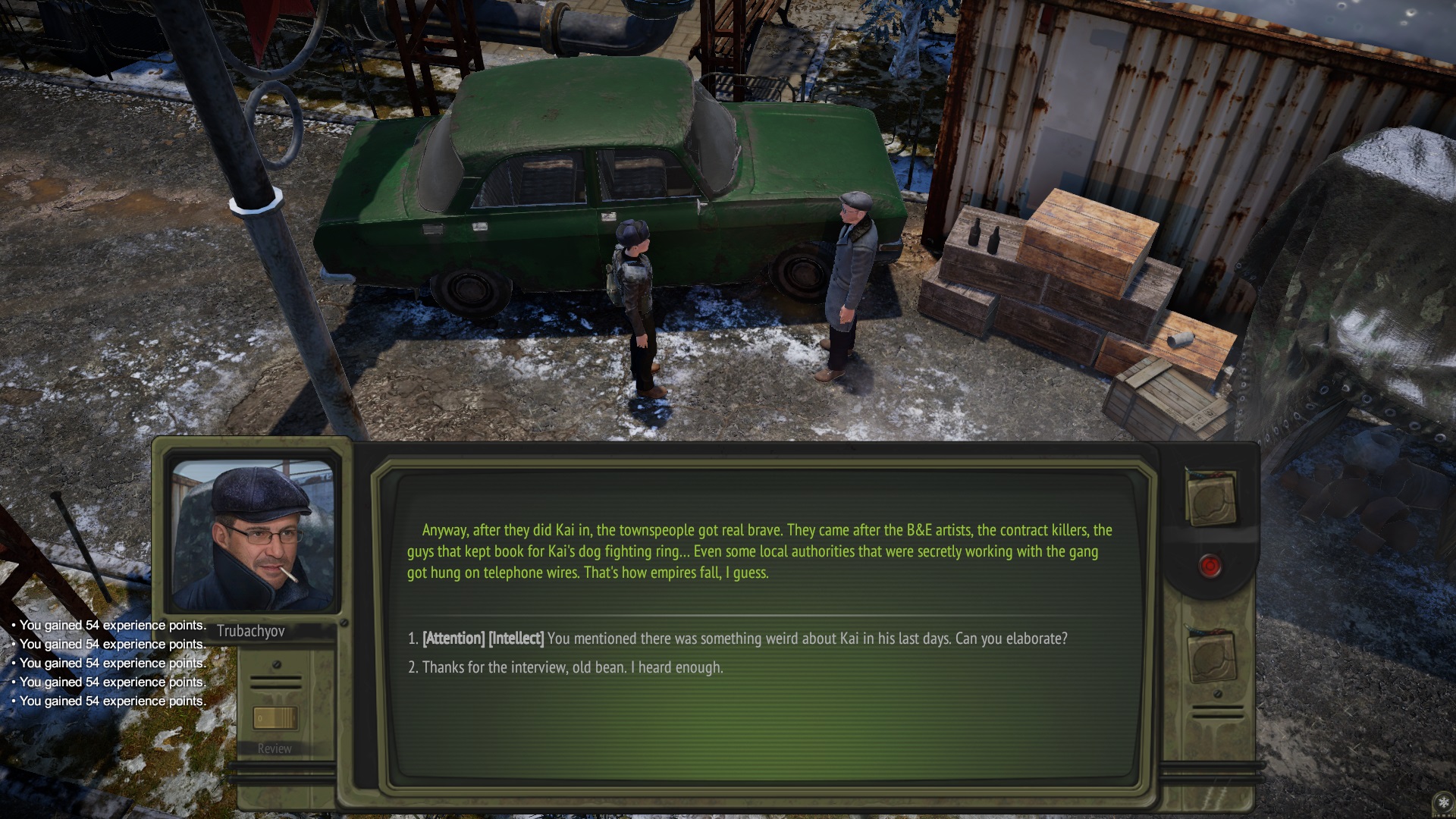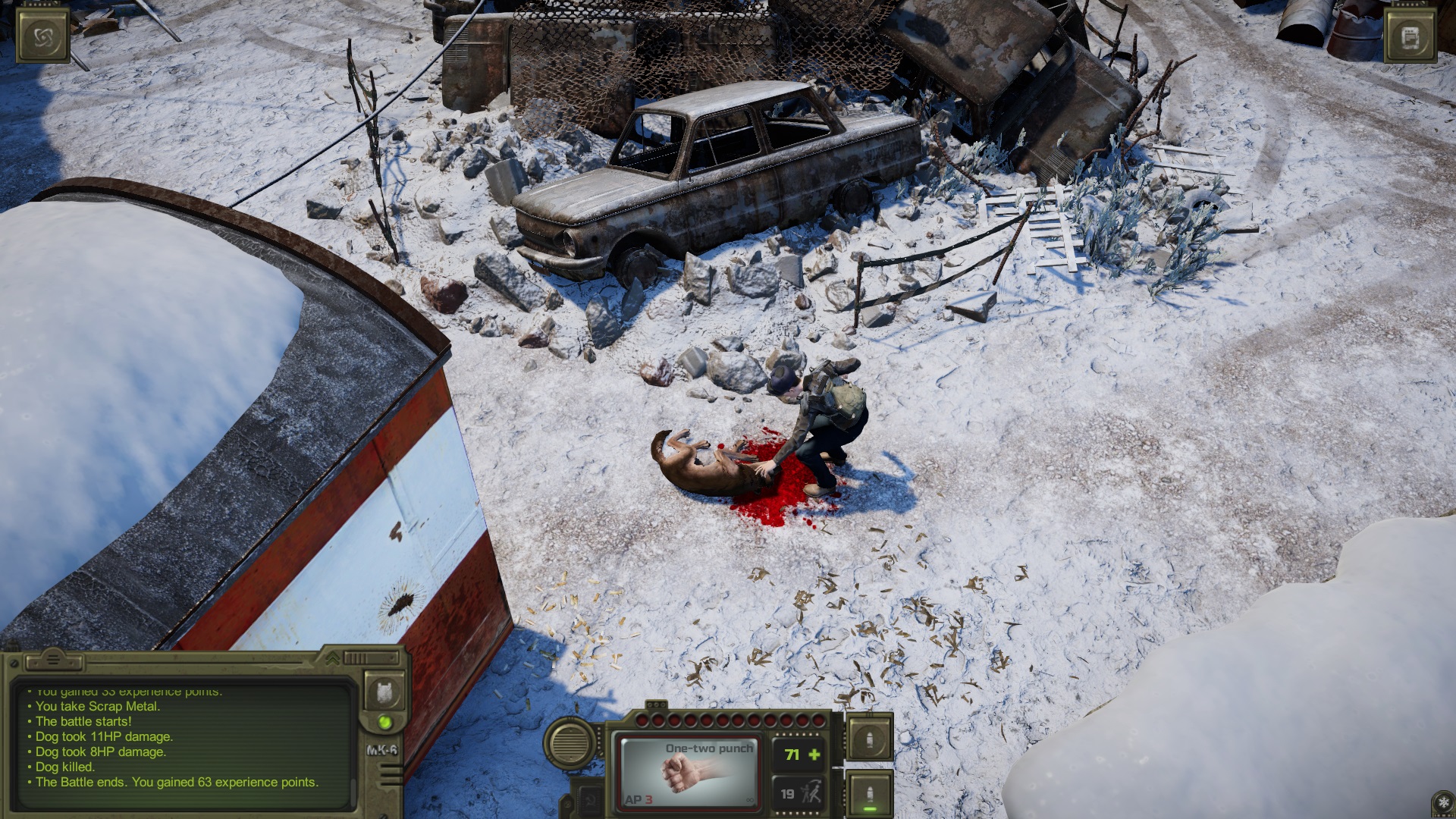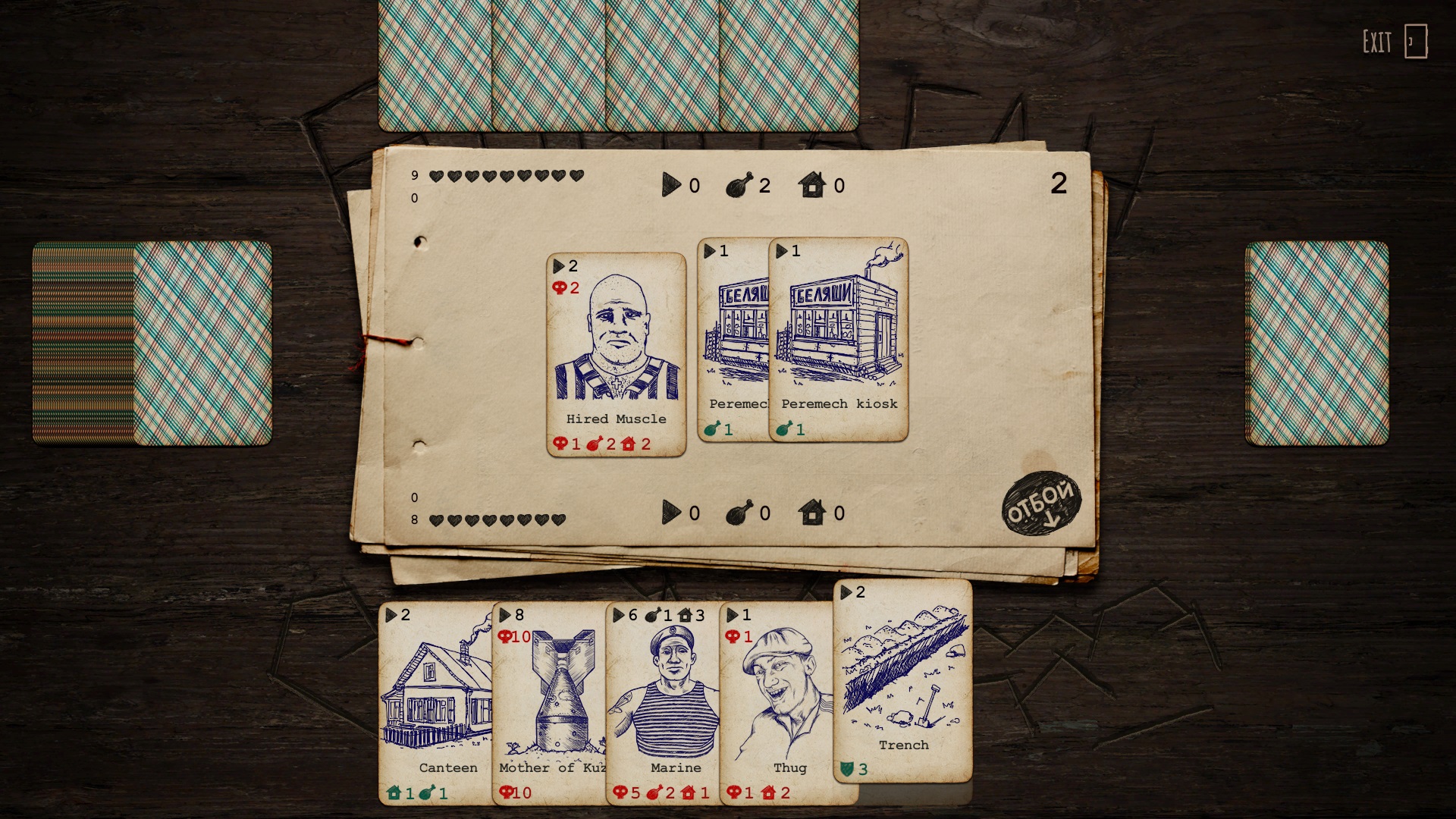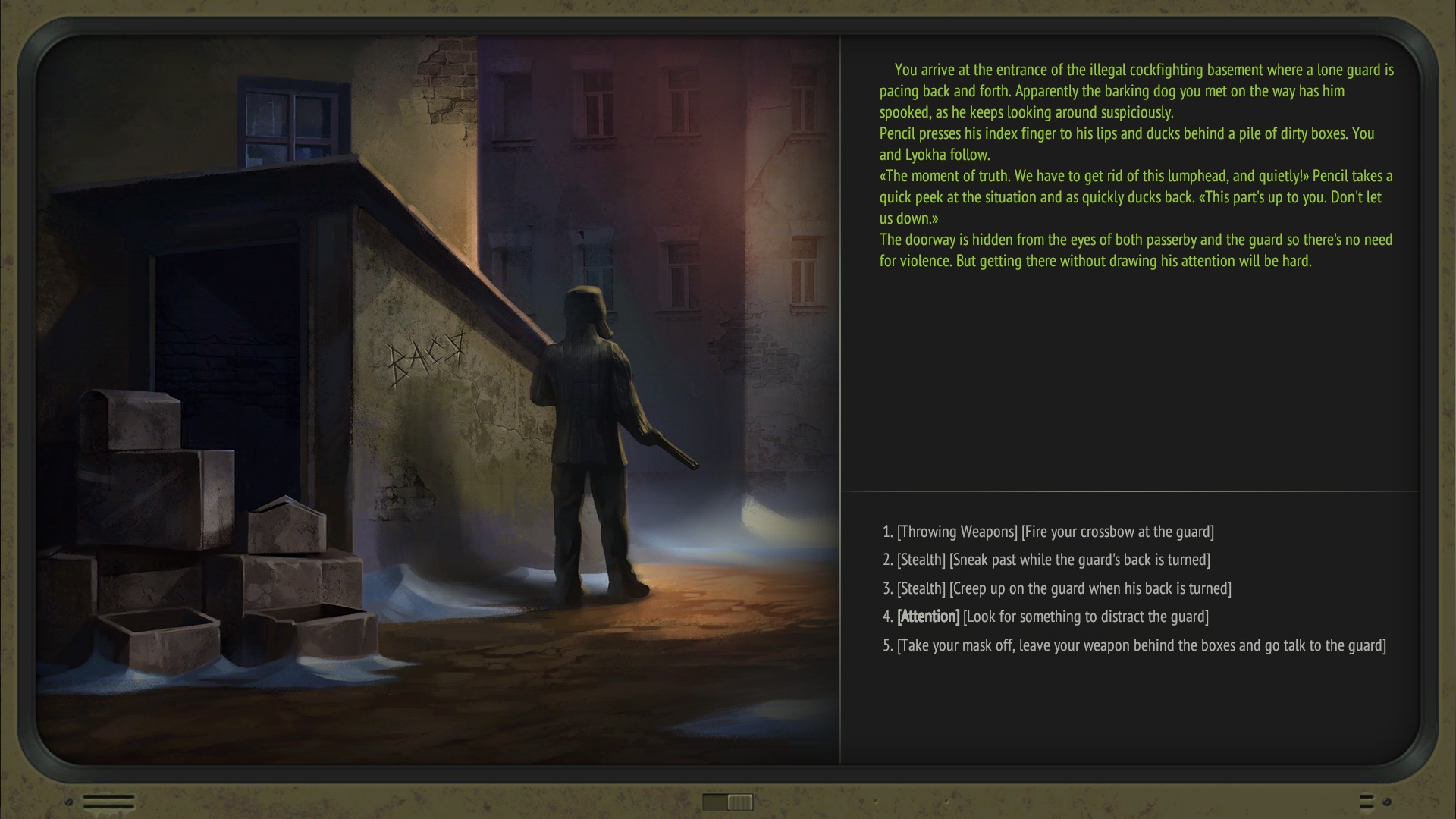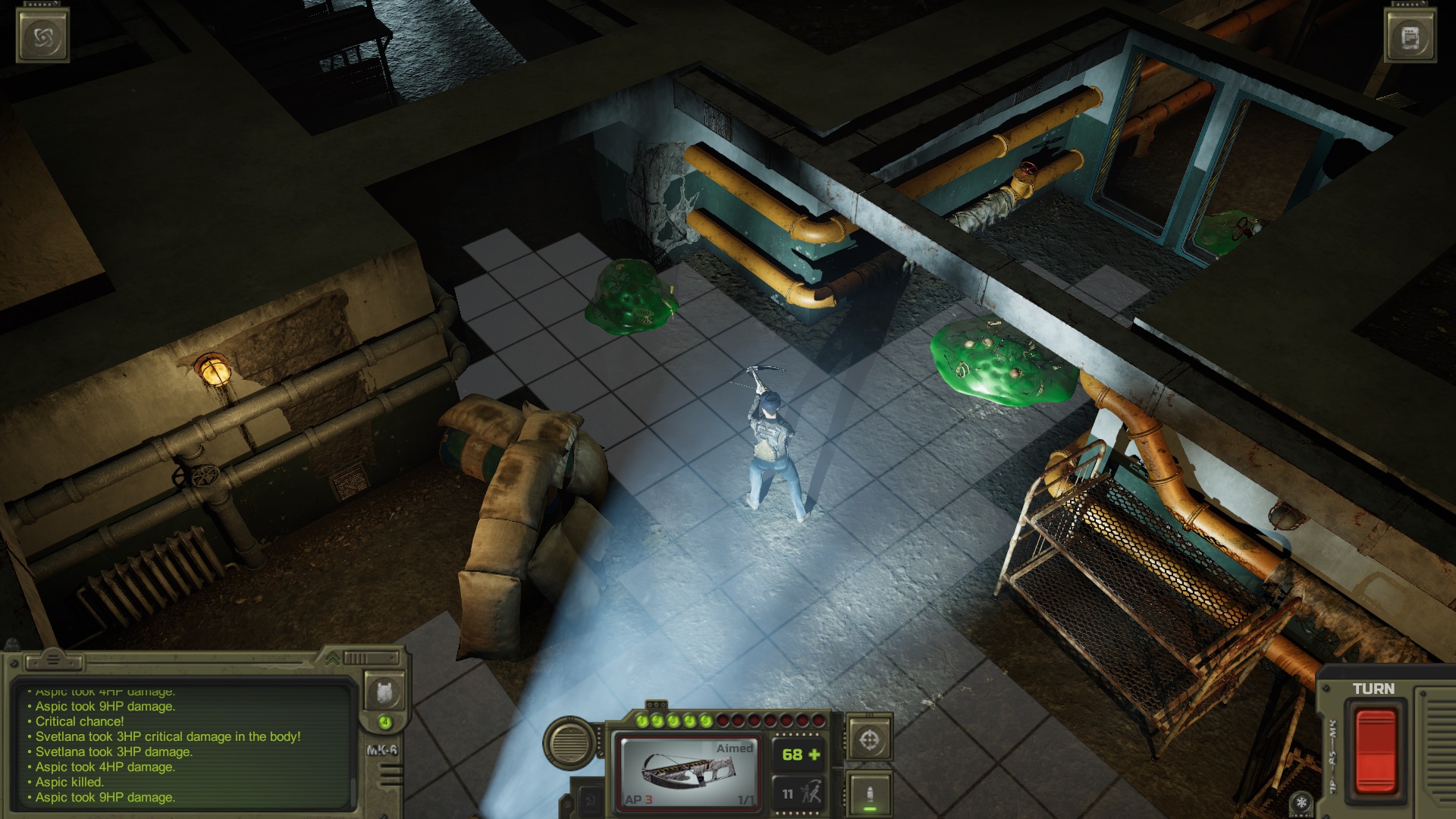-
Welcome to rpgcodex.net, a site dedicated to discussing computer based role-playing games in a free and open fashion. We're less strict than other forums, but please refer to the rules.
"This message is awaiting moderator approval": All new users must pass through our moderation queue before they will be able to post normally. Until your account has "passed" your posts will only be visible to yourself (and moderators) until they are approved. Give us a week to get around to approving / deleting / ignoring your mundane opinion on crap before hassling us about it. Once you have passed the moderation period (think of it as a test), you will be able to post normally, just like all the other retards.
You are using an out of date browser. It may not display this or other websites correctly.
You should upgrade or use an alternative browser.
You should upgrade or use an alternative browser.
Incline ATOM RPG: Trudograd - standalone expansion sequel to ATOM RPG
- Thread starter Abu Antar
- Start date
deuxhero
Arcane
Will Electra reappear? She just kinda disappeared after her quest in the original.
Well, this should be easier with custom level 15 start. You even start with an assault rifle.
Although tbh I don't get Sneaking and Pickpocket.
You can try going for 150 on both and you still consistently fail to do any pickpocketing in the first inn.
 Talk about worthless.
Talk about worthless.
Although tbh I don't get Sneaking and Pickpocket.
You can try going for 150 on both and you still consistently fail to do any pickpocketing in the first inn.
- Joined
- Jan 9, 2011
- Messages
- 2,857
![Glory to Codexia! [2012] Codex 2012](/forums/smiles/campaign_tags/campaign_slushfund2012.png)
![Have Many Potato [2013] Codex 2013](/forums/smiles/campaign_tags/campaign_potato2013.png)
![The Year of Incline [2014] Codex 2014](/forums/smiles/campaign_tags/campaign_incline2014.png)





























Horvatii
Unwanted
- Joined
- Dec 15, 2019
- Messages
- 563
Jesus christ, the fantastically shit of minimal thought you read on the internet.a fantastic piece of minimalist industrial design
When I was in 6th grade I would scribble my initials on paper borders and leave out one vertical line to merge them!
G E N I U S phantastique !
That must be the most used up, beaten horse of logos ever...
jackofshadows
Arcane
- Joined
- Oct 21, 2019
- Messages
- 5,293
Yup, with import feature they cornered themselves pretty hard, given game's skill system: too low checks are meaningless while too high like you've pointed out looks ridiculous. Btw, is skill cap the same in Trudograd? Vanilla has 199 and with the possibility to raise them by 30 per level and finishing the game on ~15 (higher difficulties aside), plus 100-200 bonus skill points it was possible to have 3 maxed out skills even on 15 'base' level. 'Gorizontal' char progression seems pretty boring but I'll check that for myself soon. Gonna import OP char and feel guilty pleasure at its finest.Although tbh I don't get Sneaking and Pickpocket.
You can try going for 150 on both and you still consistently fail to do any pickpocketing in the first inn.
Talk about worthless.
Ihavenoidea
Educated
- Joined
- May 12, 2020
- Messages
- 80
So, how big are the consequences from the previous game - "end slides" big, or "you killed a minor drug dealer and his friends are out to get you" big?
I've bought Trudograd on gog and my inner miser is happy about the discount from owining previous game, while my gamer self thinks you guys deserve full money, I might return it just to get it without discount.
I've bought Trudograd on gog and my inner miser is happy about the discount from owining previous game, while my gamer self thinks you guys deserve full money, I might return it just to get it without discount.
jackofshadows
Arcane
- Joined
- Oct 21, 2019
- Messages
- 5,293
I'm so fucking confused by perk tree and traits rework. This game truly doesn't know if it's expantion or sequel. The tree looks like this:

Inner circle is a 1st level, then goes 2 etc till forth, external circle. Any perk from 1 level costs 1 point, from 2 - 2 points and so on. Now, for each level char gets 3 points. So even without import you have 45 (!) points to spare and this is a fucking beginning of the game. I mean, you choosing like the most juicy perks, discard trash perks which is plenty there and then what? Well, at least some diversity instead of basically mandatory for solo 'Think like the enemy' root (and then the game ends).
As for traits, now they're balanced :sawyersmile: In the base game they were too far on a power scale from each other indeed but why do rebalance now? For instance, my first char has Morphine Doctor which was not OP but like tier 2 power. Now it became 'Deadly Doc' with permanent addict debuff which is impossible to cure. What the fuck?! I guess import has its downsides after all.

Inner circle is a 1st level, then goes 2 etc till forth, external circle. Any perk from 1 level costs 1 point, from 2 - 2 points and so on. Now, for each level char gets 3 points. So even without import you have 45 (!) points to spare and this is a fucking beginning of the game. I mean, you choosing like the most juicy perks, discard trash perks which is plenty there and then what? Well, at least some diversity instead of basically mandatory for solo 'Think like the enemy' root (and then the game ends).
As for traits, now they're balanced :sawyersmile: In the base game they were too far on a power scale from each other indeed but why do rebalance now? For instance, my first char has Morphine Doctor which was not OP but like tier 2 power. Now it became 'Deadly Doc' with permanent addict debuff which is impossible to cure. What the fuck?! I guess import has its downsides after all.
So I'm gonna pick them first, then drink oblivion potion in the base game, finish it and then import. Crazy stuff
Last edited:
razvedchiki
Magister
is the rifle builds still king?
Sykar
Arcane
So when will we get the overhauled perk tree in the base game?


Forest Dweller
Smoking Dicks
- Joined
- Oct 29, 2008
- Messages
- 12,382
Hey everyone, I haven't really read this thread and have zero interest in this game, but I was just wondering: has anyone made a "Turdograd" joke about this yet?
Because if not I'd like to be that person.
Because if not I'd like to be that person.
razvedchiki
Magister
Well, this should be easier with custom level 15 start. You even start with an assault rifle.
Although tbh I don't get Sneaking and Pickpocket.
You can try going for 150 on both and you still consistently fail to do any pickpocketing in the first inn.
Talk about worthless.
plox dont break the game
k thanks bye.
jackofshadows
Arcane
- Joined
- Oct 21, 2019
- Messages
- 5,293
Just Trudograd.Did they fix the perks/traits/character building, if so does it apply to the basegame or just Trudograd?
By fix I mean, is it less boring than before.
Played a bit around the game with imported char the saving did not worked, OK made the one from scratch its super streamlined now, you need 3 skills on 160: I took speechcraft, lockpicking, trade and riffles at 100 managed to do every quest from first map except one, get to second map there failed to pass the checks OK, killed some mutants, opened some locks got onto level 16 and passed them with 190, what I liked: New perk tree, skills having perks at level of 100 and 150, freezing and hunger mechanics made sense to eat more there, some of those CYOA quests were fun some were not, Voice acting was shit but its early access beta so OK some of new distinctions changed so much though so its better to start new char. Payed this time from get go to support Comrades developers but will wait for version 1.1 now going to play base game to get nicely optimized build for part two.
is the rifle builds still king?
Witcher and such perks only apply to riffles and shotguns now so given that ammo is limited its still the best choice Comrade, sure automatic riffles are bit better at the end of game but they eat ammo like crazy and you can avoid much of fights versus humans in this game from what I seen so far. You can bash enemies with butt stocks but not bayonets so its bit
 too where is the game when I can bayonet Kwan imperialists and their lackeys Comrade?
too where is the game when I can bayonet Kwan imperialists and their lackeys Comrade?Ninjerk
Arcane
- Joined
- Jul 10, 2013
- Messages
- 14,323
We are well trained in bayonet warfare, pidorashka.is the rifle builds still king?
Witcher and such perks only apply to riffles and shotguns now so given that ammo is limited its still the best choice Comrade, sure automatic riffles are bit better at the end of game but they eat ammo like crazy and you can avoid much of fights versus humans in this game from what I seen so far. You can bash enemies with butt stocks but not bayonets so its bittoo where is the game when I can bayonet Kwan imperialists and their lackeys Comrade?
razvedchiki
Magister
- Joined
- Jan 28, 2011
- Messages
- 100,496















https://www.rockpapershotgun.com/20...is-about-a-third-of-a-game-but-a-great-third/
ATOM RPG Trudograd is about a third of a game - but a great third

The heavily Fallout-inspired ATOM RPG has been on my “play more” list for almost a year, since I enjoyed a few hours of it but was distracted by something else. It is my fault. I am very distractable. Happily its developers, AtomTeam, have just released a standalone expansion called Trudograd. It entered Steam Early Access on Monday (or you can get it on GOG, if you prefer).If you’ve not played ATOM, Trudograd is a surprisingly welcoming place to start, but my advice is to give it a while longer in the oven. I have a feeling it’ll be worth the wait.
The setup of ATOM, and in fact an awful lot of what it does, will be familiar to anyone who’s played the original Fallout games. America and the USSR nuked each other, and the remnant of a semi-legitimate military/scientific organisation sends you out into the wasteland many years later to explore. You’ll wander a dusty geigerworld fighting mutants and grumpy men in makeshift armour, visiting settlements and talking to many people, discovering a sinister plot along the way. Character levelling works similarly, with a high emphasis on core attributes like strength and intelligence, which are directly tested in dialogue, and skills like medicine, lockpicking, and crafting having a drastic effect on what your options are when it comes to resolving fights and subplots.
Rejoice! You can scale the UI up instead of hunching over the screen like a diseased gremlin.
All that carries over to Trudograd. Your character from the base game (or a new one you create, who will start at level 15 and answer a few questions in a dream sequence to determine the outcome of earlier events) is sent to the city of Trudograd to track down an experimental pre-war weapon that your bosses think can shoot down an Earthbound asteroid. It’s a solid hook, and as this expansion is confined to one city, the condensed space makes the main plot thread feel closer, and more connected to everything else you’re doing.
That’s not to say it’s exactly overflowing at the moment. AtomTeam estimate that about 30% of the game’s stories and side jobs are in, and the rest will be done in six months or so. There are five city districts are far as I can tell, which work like the named locations in Fallout: you move between them on a functionally flat world map, and appear in a top-down 3D area when you reach one, or a random encounter along the way triggers a fight. Those random encounters can be avoided with the right skills, or faced head on for a fight and some combat XP and resources.
They’re very lacking at present. I was able to skip the humans ones with a Speechcraft check, but was repeatedly attacked by wolves, sometimes several times in a row. My stealth and survival skills would fail, but then the actual map for the fight would load, and the wolves mostly stood around at random spots on the map until I used a side alley to avoid them and recommence my journey.
I felt a little bit bad kicking them to death, but I needed the screenshots.
I wasn’t exactly sorry that was possible, because combat is its weak spot, although the first of two caveats to that is the obvious “it’s in early access and needs balancing” one. It works, again, much like Fallout’s did. Real time movement switches to turn-based grid action when someone throws down, with move order determined by initiative, range by up to 10 action points (depending on a character’s stats and perks), two active weapon/item slots, and the ability to aim at specific body parts for special effects.
Damages are a bit uneven, and while everything works, it lacked the solid, punchy satisfaction of some of its peers. Getting stunned on a critical hit is a death sentence, totally skipping multiple turns, and I’ve no idea who, if anyone, was a recruitable meat shield. There’s no shortage of options, as Trudograd’s crafting system offers a range of homemade guns, knives, and bombs, and perk points given upon each new level can be put into mostly combat-oriented special attacks, powers, or bonuses (these apply retroactively, so a “1% per level” bonus will give a full 20% if taken for the first time at level 20).
I never played its built-in card game because learning new things is for people who don’t know everything.
I didn’t enjoy the combat, but that’s at least partly because of my other caveat: it’s very easy to avoid. I feared I’d made a mistake by creating a frail, poor fighter of a character with bags of personality and the Speechcraft skill instead, because that is often a miserable RPG path. But despite my meagre skill in punching and a failure to find any NPC lackeys, I realised late in my time with it that I’d sailed through 32 quests, and killed only one person. And even that was optional. Well, I suppose two, if you count the one that someone else shot to protect me after I screwd up a skill check. And you might count another two who were executed by revolutionaries while I did nothing. The wife of one of them certainly did. But hey, that’s why… what don’t we do, kids? We don’t marry scumbags.
The talking approach works very well indeed, and there are lots of skill checks in its many dialogues to convince, threaten, or bargain with people for alternative paths through its quests. It helps that almost everyone you talk to has a fair bit to say, and will likely have a hand in a quest at some point. There’s enough going on with them that I felt comfortable ditching some of the very first characters I spoke to simply because I disliked them personally, even though it probably meant missing out on potential side jobs and/or XP. You gain a great deal of XP for simply chatting to people enough, and I’ve had some fun mini-adventures just doing the odd jobs I normally find a chore in bigger games.
This was a really fun side bit, but I’d like to switch the narration off. It distracts me from reading.
I’ve talked a writer into walking into a minefield. I gained a level after listening to some old women ramble on a bench. I’ve sucker-shot a top hatted millionaire with a crossbow, then taken a pastry of his corpse and eaten it. At one point during an interesting, text-based side mission that reminded me of the weird text adventure bits of Space Rangers 2, I failed to bluff a common guard, alerting a whole base to my presence, but subsequently bluffed his boss into surrendering the entire base without a fight. I have been in precisely zero fair fights, but I’ve told enough barefaced lies to convince people I’m very dangerous. You can just brazen it sometimes, and I enjoyed that very much. It helps a lot that there’s a consistent vein of gentle humour, with a distinctly Eastern European (the dev team are dotted about all over the place) fatalism and surrealism that keeps the potential grimness at bay without becoming wacky.
Some side jobs only appear when new characters show up midway into the game, and open a new dimension on several other NPCs. There’s a particularly good one about an interview that I twigged onto early but played along with anyway for the fun of it, and another bit where I met someone new, and was sure – sure I’d heard his name mentioned, but couldn’t remember where. And just the fact that I vaguely recognised his name was enough to make me back out of an offer he’d made. I loved this moment. Look at this! I’m roleplaying in-character thought processes in an RPG. Crikey, it’s been too long since that happened.
Slimes in a non-fantasy setting is sort of novel, but they’re still lacklustre.
But. But but but. What’s here is interesting, and more like its influences (in the interests of fairness, I should point out that it’s inspired by other classic RPGs like Deus Ex and Baldur’s Gate too) than the many other games that have staked a claim to this territory… it is a bit lacking at present. You’ll be getting about a third of an expansion, and while you can absolutely start here, its strengths make me feel its empty spaces more keenly. The main plot hits a dead end much faster than some of the subplots, with one whole area being conspicuously devoid of people.
Dead characters sometimes sort of lean back and hover in the air instead of falling over. Skills are measured from a counter-intuitive 0-300, the survival elements are sort of pointless (and cooking currently doesn’t work), and there are the usual minor proofreading issues, and the quest log could use better notes about which name is who. More seriously, I had a hard time early on with frequent crashes. A support page on GOG vastly improved – but didn’t fully eliminate – this issue.
The lighting has an oddly warm look at night. Most of the city is currently locked off, though.
Trudograd might be a hard sell for players used to modern RPGs. It’s far more approachable than most consciously retro-inspired RPGs, and it modernises the formula and structure of Interplay’s legendary post-apocalypse adventures about as far as such a tributary game could. I’m on board. I want more. But if I’m being candid, I would have preferred to wait for its full release.
Last edited:









